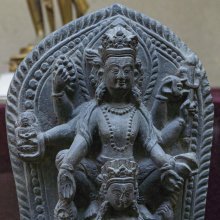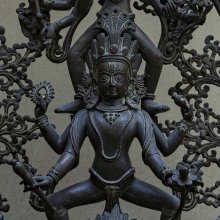Vahana, Vāhana: 27 definitions
Introduction:
Vahana means something in Buddhism, Pali, Hinduism, Sanskrit, the history of ancient India, Marathi, Jainism, Prakrit, Hindi. If you want to know the exact meaning, history, etymology or English translation of this term then check out the descriptions on this page. Add your comment or reference to a book if you want to contribute to this summary article.
Alternative spellings of this word include Vahan.
Images (photo gallery)
(+64 more images available)
In Hinduism
Purana and Itihasa (epic history)
Source: archive.org: Puranic EncyclopediaVāhana (वाहन).—(conveyance) To know about the conveyances of Rudra, Yama and so on, see under Jaladhi.
Source: archive.org: Shiva Purana - English Translation1) Vāhana (वाहन) refers to “vehicles”, which are mentioned as obtainable through the worship of Śiva, according to the Śivapurāṇa 2.1.14:—“[...] for achieving glory with plenty of vehicles (vāhana), worship for a thousand times shall be performed. A person desiring salvation shall worship Śiva five crores of times with deep devotion”.
2) Vāhana (वाहन) refers to “Vīrabhadra’s chariot”, according to the Śivapurāṇa 2.2.33. Accordingly, as Brahmā narrated to Nārada:—“[...] Receiving his command, with his head bowed down in reverence, Vīrabhadra set off immediately to the place of sacrifice. [...] The chariots (vāhana) numbered as many as two thousand Nalvas of land could contain. Ten thousand lions pulled the chariots strenuously”.
Source: Cologne Digital Sanskrit Dictionaries: The Purana Index1a) Vāhana (वाहन).—A pupil of Kṛta.*
- * Brahmāṇḍa-purāṇa II. 35. 51.
1b) Different riding animals used by warriors in the battlefield described.*
- * Brahmāṇḍa-purāṇa IV. 22. 15-18.

The Purana (पुराण, purāṇas) refers to Sanskrit literature preserving ancient India’s vast cultural history, including historical legends, religious ceremonies, various arts and sciences. The eighteen mahapuranas total over 400,000 shlokas (metrical couplets) and date to at least several centuries BCE.
Jyotisha (astronomy and astrology)
Source: Wisdom Library: Brihat Samhita by VarahamihiraVāhana (वाहन) refers to the “vehicles” (of fighting men), according to the Bṛhatsaṃhitā (chapter 4), an encyclopedic Sanskrit work written by Varāhamihira mainly focusing on the science of ancient Indian astronomy astronomy (Jyotiṣa).—Accordingly, “If Jupiter should be eclipsed by the lunar disc the men of Gāndhāra, of Sauvīraka, of Sindhu and of Kīra (Kāśmīra) the rulers of the Draviḍa countries and Brāhmins as well as food grains and mountains will suffer for ten months. If Mars should be so eclipsed the rulers of Traigarta (Lāhora) and of Mālavā, with their fighting men in their cars [i.e., vāhana], the chiefs of Kulinda, the rulers of Śibi, of Audha, of Kuru (Delhi), of Matsya and of Śukti will suffer for six months”.

Jyotisha (ज्योतिष, jyotiṣa or jyotish) refers to ‘astronomy’ or “Vedic astrology” and represents the fifth of the six Vedangas (additional sciences to be studied along with the Vedas). Jyotisha concerns itself with the study and prediction of the movements of celestial bodies, in order to calculate the auspicious time for rituals and ceremonies.
Shaktism (Shakta philosophy)
Source: Google Books: ManthanabhairavatantramVāhana (वाहन) refers to “vehicles”, according to the Kubjikāmata-tantra, the earliest popular and most authoritative Tantra of the Kubjikā cult.—Accordingly, “One who, having abandoned a teacher who is blissful and Command is radiant, goes to another, is obstructed everywhere, like a king who has lost his kingdom. He who maintains his body (pure), (guards his) knowledge of (the Kaula sacrificial) substances, (looks after the) clothes and vehicles (vastra-vāhana) of his teacher is worthy of receiving initiation”.

Shakta (शाक्त, śākta) or Shaktism (śāktism) represents a tradition of Hinduism where the Goddess (Devi) is revered and worshipped. Shakta literature includes a range of scriptures, including various Agamas and Tantras, although its roots may be traced back to the Vedas.
In Buddhism
Theravada (major branch of Buddhism)
Source: Pali Kanon: Pali Proper NamesOne of the three palaces of Sikhi Buddha before his Renunciation. Bu.xxi.16; but BuA. (p. 201) calls it Narivasabha.
Theravāda is a major branch of Buddhism having the the Pali canon (tipitaka) as their canonical literature, which includes the vinaya-pitaka (monastic rules), the sutta-pitaka (Buddhist sermons) and the abhidhamma-pitaka (philosophy and psychology).
Tibetan Buddhism (Vajrayana or tantric Buddhism)
Source: MDPI Books: The Ocean of HeroesVāhana (वाहन) refers to the “vehicle” (of a deity), according to the 10th-century Ḍākārṇava-tantra: one of the last Tibetan Tantric scriptures belonging to the Buddhist Saṃvara tradition consisting of 51 chapters.—Accordingly: [while explaining the body circle (kāyacakra)]: “[...] There are also other females [who are] headless and running, headless and dancing, and legless and sleeping. [...] [They] should be known in [their] respective colors. Everyone has a vehicle (vāhana). [...]”.

Tibetan Buddhism includes schools such as Nyingma, Kadampa, Kagyu and Gelug. Their primary canon of literature is divided in two broad categories: The Kangyur, which consists of Buddha’s words, and the Tengyur, which includes commentaries from various sources. Esotericism and tantra techniques (vajrayāna) are collected indepently.
General definition (in Buddhism)
Source: Wisdom Library: BuddhismVāhana (वाहन) is the twenty-sixth of sixty digits (decimal place) in an special enumeration system mentioned by Vasubandhu in his Abhidharmakośa (“treasury of knowledge”). The explanations of the measure of years, eons, and so forth must be comprehended through calculation based on a numerical system. Enumeration begins from one and increases by a factor of ten for each shift in decimal place. The sixtieth number in this series is called “countless”.
Among these decimal positions (e.g., vāhana), the first nine positions from one to one hundred million are called ‘single set enumeration’. From a billion up to, but not including countless is “the enumeration of the great companion” and is called the ‘recurring enumeration’.
India history and geography
Source: Cologne Digital Sanskrit Dictionaries: Indian Epigraphical GlossaryVāhana.—(LP), a load-carrier; a cart, ship, etc. See vahitra. Note: vāhana is defined in the “Indian epigraphical glossary” as it can be found on ancient inscriptions commonly written in Sanskrit, Prakrit or Dravidian languages.
Source: Heidelberg: Glory of the Tiruvanantapuram Padmanabhasvami TempleVāhana (वाहन) refers to the “vehicles (that are used to carry the deity)” (during festivals at Hindu temples), according to the Syānandūrapuravarṇana-prabandha by Svāti-Tirunāḷ (1813-1846) (one of the rulers of Travancore) which deals with the different activities of the Thiruvananthapuram Temple, including ceremonies and festivals.—In the sixth chapter, Utsavapraśaṃsā, there is a detailed account of the annual festival with all its aspects, which even includes the daily procession and the specifics of the vāhanas (vehicles) that are used to carry the deity:
first day—siṃha-vāhana,
second day—ananta-vāhana,
third day—kamala-vāhana,
fourth and seventh day—āndolikā,
sixth day—indra-vāhana and
eight, ninth and tenth day—garuḍa-vāhana.

The history of India traces the identification of countries, villages, towns and other regions of India, as well as mythology, zoology, royal dynasties, rulers, tribes, local festivities and traditions and regional languages. Ancient India enjoyed religious freedom and encourages the path of Dharma, a concept common to Buddhism, Hinduism, and Jainism.
Languages of India and abroad
Pali-English dictionary
Source: BuddhaSasana: Concise Pali-English Dictionaryvahana : (nt.) carrying; bearing; flowing. || vāhana (nt.), a vehicle.
Source: Sutta: The Pali Text Society's Pali-English DictionaryVahana, (adj. nt.) (fr. vah) 1. carrying VvA. 316; DhA. III, 472 (dhura°).—2. a current J. IV, 260. (Page 606)
— or —
Vāhana, (fr. vāheti) 1. (adj.) carrying, pulling, drawing Vin. II, 122 (udaka°-rajju); J. I, 136 (kaṭṭha° gathering fire-wood); PvA. 127 (ratha-yuga°).—2. (nt.) conveyance, beast of burden, monture Vin. I, 277 (°āgāra stable, garage); Sn. 442 (Māra sa° with his elephant); Pv. II, 926; DhA. I, 192 (hatthi°, elephant-mount; cp. p. 196, where five. vāhanāni, belonging to King Pajjota, are enumerated, viz. kaṇeru, dāsa, dve assā, hatthi).—bala° army & elephants, i.e. army in general, forces J. I, 262. (Page 611)

Pali is the language of the Tipiṭaka, which is the sacred canon of Theravāda Buddhism and contains much of the Buddha’s speech. Closeley related to Sanskrit, both languages are used interchangeably between religions.
Marathi-English dictionary
Source: DDSA: The Molesworth Marathi and English Dictionaryvahana (वहन).—n (S) A vehicle or means of conveyance in general. 2 Carrying or conveying.
--- OR ---
vahāṇa (वहाण).—f (vāhaṇēṃ) Stream, current, flow. 2 A stream or brook. 3 A sandal. Pr.pāyāñcī va0 pāyīṃ asāvī Let every (person or thing) be in its proper sphere or place; ne sutor ultra crepidam.
--- OR ---
vāhana (वाहन).—n C A stone-mortar, esp. as fixed in the ground.
--- OR ---
vāhana (वाहन).—n (S) A vehicle or means of conveyance generally. Ex. of comp. garuḍavāhana, naravāhana, ākhuvāhana, aśvavāhana.
--- OR ---
vāhāṇa (वाहाण).—f (Better vahāṇa) Stream or current. 2 A sandal. v bhara.
Source: DDSA: The Aryabhusan school dictionary, Marathi-Englishvahana (वहन).—n A vehicle. Carrying.
--- OR ---
vahāṇa (वहाण).—f Stream; a brook. A sandal. pāyāñcī vahāṇa pāyīṃ asāvī Let every person (or thing) be in its proper sphere or place.
--- OR ---
vāhaṇa (वाहण) [-ṇī, -णी].—f Stream. The carrying of a reaped field.
--- OR ---
vāhana (वाहन).—n A vehicle. A stone-mortar.
Marathi is an Indo-European language having over 70 million native speakers people in (predominantly) Maharashtra India. Marathi, like many other Indo-Aryan languages, evolved from early forms of Prakrit, which itself is a subset of Sanskrit, one of the most ancient languages of the world.
Sanskrit dictionary
Source: DDSA: The practical Sanskrit-English dictionaryVahana (वहन).—[vah-lyuṭ]
1) Carrying, bearing, conveying.
2) Supporting.
3) Flowing.
4) A vehicle, conveyance.
5) A boat, raft.
6) The undermost part of a column.
Derivable forms: vahanam (वहनम्).
--- OR ---
Vāhana (वाहन).—[vāhayati vah-ṇic lyu lyuṭ vā]
1) Bearing, carrying, conveying.
2) Driving (as a horse).
3) A vehicle, conveyance of any kind; Manusmṛti 7.75; निजानुजेनातिथितामुपेतः प्राचीपतेर्वाहनवारणेन (nijānujenātithitāmupetaḥ prācīpatervāhanavāraṇena) N.22.45.
4) An animal used in riding or draught, as a horse; स दुष्प्रापयशाः प्रापदाश्रमं श्रान्त- वाहनः (sa duṣprāpayaśāḥ prāpadāśramaṃ śrānta- vāhanaḥ) R.1.48;9.25,6.
5) An elephant.
5) An oar; अस्य वाहनसंयुक्तां (asya vāhanasaṃyuktāṃ) ... नावमुपाहर (nāvamupāhara) Rām.2.52.6.
-nā An army; वाहनाजनि (vāhanājani) Śiśupālavadha 19.33.
Derivable forms: vāhanam (वाहनम्).
Source: Cologne Digital Sanskrit Dictionaries: Edgerton Buddhist Hybrid Sanskrit DictionaryVāhana (वाहन).—m., a high number: Mahāvyutpatti 8014 = Tibetan ded ḥdren; compare vāhana-prajñapti, and mahā-vāhana.
Source: Cologne Digital Sanskrit Dictionaries: Shabda-Sagara Sanskrit-English DictionaryVahana (वहन).—n.
(-naṃ) 1. Bearing, conveying. 2. Flowing, (as a stream.) 3. Any vehicle. 4. A raft, a float. E. vah to bear, lyuṭ aff.
--- OR ---
Vāhana (वाहन).—n.
(-naṃ) 1. A vehicle, a conveyance of any kind, as a horse, an elephant, a carriage. 2. Carrying, conveying, &c. 3. Making effort or exertion. E. vah to bear, causal form, or vāh to endeavour, lyuṭ aff.
Source: Cologne Digital Sanskrit Dictionaries: Benfey Sanskrit-English DictionaryVahana (वहन).—[vah + ana], n. 1. Bearing. 2. Flowing. 3. Any vehicle. 4. A raft, a boat.
--- OR ---
Vāhana (वाहन).—i. e. vah + ana, n. 1. Carrying, [Pañcatantra] 253, 13; bearing, 83, 19. 2. Governing (of horses), [Nala] 15, 2. 3. A vehicle, [Hitopadeśa] 126, 16; [Mānavadharmaśāstra] 7, 222; a chariot, [Hitopadeśa] iv. [distich] 62; a horse, [Mānavadharmaśāstra] 5, 29; an elephant.
Source: Cologne Digital Sanskrit Dictionaries: Cappeller Sanskrit-English DictionaryVahana (वहन).—[adjective] (—°) & [neuter] conducting, carrying, bearing; [neuter] also flowing, ship.
--- OR ---
Vāhana (वाहन).—[adjective] carrying, bringing. [neuter] ([masculine]) beast of burden or beast for riding; vehicle i.[grammar], waggon ship, oar, sail (adj. —° riding or going in); [neuter] drawing, carrying, driving, riding, guiding (a horse).
Source: Cologne Digital Sanskrit Dictionaries: Monier-Williams Sanskrit-English Dictionary1) Vahana (वहन):—[from vah] mfn. bearing, carrying, conveying (See rāja-v)
2) [v.s. ...] n. the act of bearing, carrying, conveying, bringing, [Mahābhārata; Kāvya literature; Varāha-mihira’s Bṛhat-saṃhitā]
3) [v.s. ...] the flowing (of water), [Nirukta, by Yāska vi, 2]
4) [v.s. ...] a ship, vessel, boat, [Kathāsaritsāgara]
5) [v.s. ...] the undermost part of a column, [Varāha-mihira’s Bṛhat-saṃhitā]
6) [v.s. ...] a square chariot with a pole, [cf. Lexicographers, esp. such as amarasiṃha, halāyudha, hemacandra, etc.]
7) Vāhana (वाहन):—[from vāh] 1. vāhana n. (for 2. See [column]2) the act of making effort, endeavouring, exertion, [Horace H. Wilson]
8) [from vāh] 2. vāhana mfn. (for 1. See [column]1) drawing, bearing, carrying, conveying, bringing etc., [Kathāsaritsāgara; Rājataraṅgiṇī]
9) [v.s. ...] m. Name of a Muni, [Catalogue(s)]
10) Vāhanā (वाहना):—[from vāhana > vāh] f. an army, [Śiśupāla-vadha xix, 33]
11) Vāhana (वाहन):—[from vāh] n. the act of drawing, bearing, carrying, conveying, [Mahābhārata; Rāmāyaṇa] etc.
12) [v.s. ...] driving, [Suśruta]
13) [v.s. ...] riding, [Kathāsaritsāgara]
14) [v.s. ...] guiding (horses), [Mahābhārata]
15) [v.s. ...] any vehicle or conveyance or draught-animal, carriage, chariot, waggon, horse, elephant (cf. [Pāṇini 8-4, 8]), [Aitareya-brāhmaṇa] etc. etc. (ifc. [f(ā). ] riding or driving on or in)
16) [v.s. ...] any animal, [Kathāsaritsāgara xxi, 30]
17) [v.s. ...] ‘oar’ or ‘sail’ [Rāmāyaṇa ii, 52, 5.]
Source: Cologne Digital Sanskrit Dictionaries: Yates Sanskrit-English Dictionary1) Vahana (वहन):—(naṃ) 1. n. A raft, a boat; bearing.
2) Vāhana (वाहन):—(naṃ) 1. n. A vehicle of any kind; as horse, carriage, &c.; conveying; endeavour; deportment.
Source: DDSA: Paia-sadda-mahannavo; a comprehensive Prakrit Hindi dictionary (S)Vahana (वहन) in the Sanskrit language is related to the Prakrit words: Vahaṇa, Vahaṇayā, Vāhaṇa, Vāhaṇā.
[Sanskrit to German]
Sanskrit, also spelled संस्कृतम् (saṃskṛtam), is an ancient language of India commonly seen as the grandmother of the Indo-European language family (even English!). Closely allied with Prakrit and Pali, Sanskrit is more exhaustive in both grammar and terms and has the most extensive collection of literature in the world, greatly surpassing its sister-languages Greek and Latin.
Hindi dictionary
Source: DDSA: A practical Hindi-English dictionary1) Vahana (वहन) [Also spelled vahan]:—(nm) conveying, carrying, bearing; transportation; hence ~[nīya] (a).
2) Vāhana (वाहन) [Also spelled vahan]:—(nm) a vehicle, conveyance; an animal used to ride upon.
...
Prakrit-English dictionary
Source: DDSA: Paia-sadda-mahannavo; a comprehensive Prakrit Hindi dictionary1) Vahaṇa (वहण) in the Prakrit language is related to the Sanskrit word: Vadhana.
2) Vahaṇa (वहण) also relates to the Sanskrit word: Vahana.
3) Vahaṇā (वहणा) also relates to the Sanskrit word: Vadhanā.
4) Vāhaṇa (वाहण) also relates to the Sanskrit word: Vāhana.
5) Vāhaṇā (वाहणा) also relates to the Sanskrit word: Vāhanā.
Prakrit is an ancient language closely associated with both Pali and Sanskrit. Jain literature is often composed in this language or sub-dialects, such as the Agamas and their commentaries which are written in Ardhamagadhi and Maharashtri Prakrit. The earliest extant texts can be dated to as early as the 4th century BCE although core portions might be older.
Kannada-English dictionary
Source: Alar: Kannada-English corpusVahana (ವಹನ):—
1) [noun] the act of bearing, carrying or conveying (something) on onself.
2) [noun] a carrying of goods from one place to another (using vehicles).
3) [noun] the act or manner of flowing; flow.
4) [noun] any vehicle as cart, motor vehicle, boat, ship, etc.
--- OR ---
Vāhana (ವಾಹನ):—
1) [noun] the act of carrying (a load).
2) [noun] the act of riding (a horse), driving (a vehicle), etc.
3) [noun] any means in or by which someone travels or something is carried or conveyed; a vehicle.
4) [noun] any drafting animal.
Kannada is a Dravidian language (as opposed to the Indo-European language family) mainly spoken in the southwestern region of India.
Nepali dictionary
Source: unoes: Nepali-English Dictionary1) Vahana (वहन):—n. 1. carrying; bearing; conveying; 2. supporting; 3. vehicle; conveyance; 4. flowing; 5. boat; raft;
2) Vāhana (वाहन):—n. 1. bearing; carrying; conveying; 2. driving; 3. vehicle; in Hindu mythology each deity;
Nepali is the primary language of the Nepalese people counting almost 20 million native speakers. The country of Nepal is situated in the Himalaya mountain range to the north of India.
See also (Relevant definitions)
Starts with: Vahana-kshamata, Vahana-shulka, Vahanabhanga, Vahanagara, Vahanaka, Vahanakara, Vahanakarashala, Vahanakarma, Vahanamandapa, Vahanapa, Vahanapatra, Vahanaprajnapti, Vahanasamyukta, Vahanashreshtha, Vahanata, Vahanatva, Vahanavapi, Vahanaya, Vahanayudha.
Ends with (+212): Abdavahana, Abhivahana, Abjavahana, Adhivahana, Adhyavahana, Agnivahana, Akhuvahana, Amitavahana, Amtarvahana, Anabhogavahana, Anantavahana, Angasamvahana, Anuvahana, Aparishrotavahana, Apavahana, Ashvahana, Ashvavahana, Atibharavahana, Atitavahana, Ativahana.
Full-text (+335): Rathavahana, Nirvahaṇa, Vrishavahana, Shikhivahana, Abjavahana, Pravahana, Varivahana, Harivahana, Shalivahana, Yamavahana, Upavahana, Mahishavahana, Simhavahana, Vadhana, Naravahana, Havyavahana, Vahanabhanga, Roshavahana, Samvahana, Hamsavahana.
Relevant text
Search found 71 books and stories containing Vahana, Vāhana, Vahāṇa, Vāhāṇa, Vāhaṇa, Vāhanā, Vahaṇa, Vahaṇā, Vāhaṇā, Vahanā; (plurals include: Vahanas, Vāhanas, Vahāṇas, Vāhāṇas, Vāhaṇas, Vāhanās, Vahaṇas, Vahaṇās, Vāhaṇās, Vahanās). You can also click to the full overview containing English textual excerpts. Below are direct links for the most relevant articles:
Animal Kingdom (Tiryak) in Epics (by Saranya P.S)
Garga Samhita (English) (by Danavir Goswami)
Verse 3.2.14 < [Chapter 2 - The Great Festival of Śrī Girirāja]
Verse 2.14.3 < [Chapter 14 - Description of Kāliya’s Story]
Verse 6.4.22 < [Chapter 4 - Journey to the City of Kuṇḍina]
Jain Remains of Ancient Bengal (by Shubha Majumder)
Tīrthaṅkara Pārśvanātha with Planetary deities and Dikpālas type < [Chapter 6 - Iconographic Study of Jaina Sculptural Remains]
Śāsanadevīs or Yakṣiṇīs from Ancient Bengal < [Chapter 6 - Iconographic Study of Jaina Sculptural Remains]
The Markandeya Purana (by Frederick Eden Pargiter)
Canto LXXXVI - The Devī-Māhātmya: The slaying of Dhūmralocana
Canto XCIV - The Raucya and future Manvantaras
Temples of Munnur (Historical Study) (by R. Muthuraman)
The Brahmotsavam Festival < [Chapter 6]
Images of Siddhi Vinayaka < [Chapter 5]
Images of Subramanya < [Chapter 5]
Lord Jhulelal: An Analytical Study (by Thakkar Harish Gopalji)
Part 5.1 - Lord Jhulelal’s Iconography < [Chapter 4 - Analysis]
Part 11 - Lord (Adhipati) and Guardian (Dikpal) of West (Paschim) < [Chapter 4 - Analysis]
Related products






